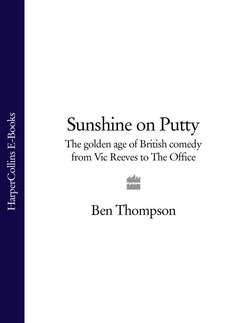Читать книгу Sunshine on Putty: The Golden Age of British Comedy from Vic Reeves to The Office - Ben Thompson, Ben Thompson - Страница 47
3. The Edinburgh Festival: Homage to Caledonia
Оглавление‘It’s like a Butlins for comedians’
Addison Cresswell
The Edinburgh Festival’s Perrier Award is sometimes dubbed ‘The Comedy Oscar’—perhaps because the people who deserve to win one don’t always seem to do so. But behind the annual carbonated product-placement hoopla lurks a unique and fascinating institution, where creative and not-so-creative currents come together in a manner reminiscent of the different tidal streams merging beneath southern Africa’s Cape Point.
On the one hand there is a prodigious bacchanal – ‘It’s like a Butlins for comedians,’ exults Addison Cresswell. ‘Three weeks with your own people!’ – degenerate enough to make even the diehard hedonists of the rock ‘n’ roll circuit jealous. To those in that decadent sphere who have never experienced it, you might say: ‘Imagine if Glastonbury lasted a month…And it was indoors. With no Healing Field.’
At the same time, the Edinburgh Festival also provides an unprecedented opportunity for career advancement. Highly polished London club sets which no one might see in a year will suddenly be scrutinized by every parasite in the sordid world of TV production – up north on expenses to pay their annual homage to Caledonia. This unique compression of the national media also offers immense creative possibilities to those who are bold enough to take them.
Steve Coogan is happy to admit to ‘quite cynically using Edinburgh as a showcase’ for his Patrick Marber-assisted change of direction, when winning the Perrier Award in 1992. But for others whose talents would prove less easily susceptible to commercial application, the festival’s semi-captive audience makes it the ideal arena in which to try to imagine themselves a career in the most creative way possible.82
Those who were lucky enough to experience the full-scale Cecil B. De Mille version of Simon Munnery’s Nietzschean cabaret Club Zarathustra in August 1996 – a show dedicated to the cause of insulting not so much its audience’s intelligence as the very fibre of their being – will never forget the majesty of what they saw.83 The yoke of shame lying upon the shoulders of whichever Channel 4 executive it was who decided not to commission a series from the TV pilot which ensued will be just as hard to shake off.84
By throwing together performers and audience in a confined space in an atmosphere of barely suppressed hysteria, the Edinburgh Festival churns up some fascinating etiquette quandaries, such as how to behave when the person who elbows you sharply to one side in their eagerness to get to the bar turns out to be the same person you just paid to make you laugh. Most people seem to handle this quite well, and if comedians are troubled by the knowledge that for the price of listening to them for an hour, their audience could have experienced not one but two troupes of Clydeside puppeteers, they manage not to show it.
It’s not just the barriers which traditionally separate performers from their audience that Edinburgh breaks down. It’s also the ones that keep them apart from each other, and perhaps even more importantly, from their critics. As exhilarating as these new-found proximities are, they can also be dangerous.
Inevitably when a group of already competitive people are thrown together in such pressurized circumstances, the odd fist-fight will result. (The memorable moment when self-destructive Waltham-stow-based misanthrope Ian Cognito decided to launch one verbal tirade too many against erstwhile getaway driver Ricky Grover, and was summarily knocked unconscious for his pains, is just one incident in a rich heritage of drunken feuding.)
Still more poignant is the tragic spectacle of media pundits who go native and – in the erroneous belief that some of Edinburgh’s magic dust will have rubbed off on them – start presenting their own shows about their festival experiences, or the vital role they have played in the evolution of rock journalism.
As incestuous and self-indulgent as all this undoubtedly is, if the Edinburgh deterrent – that you might at any moment have to justify anything you’ve written, in person, to whoever you’ve just written about – could be applied to every corner of the national press, there can be no doubt that standards of accuracy and politeness would greatly improve. (In this connection, it is always instructive to see how uptight London-based features journalists become when their attempts to use the festival as a one-stop shop for a swingeing attack on the apolitical complacency of the comedy circuit are momentarily frustrated by someone like Al Murray or Frank Skinner snatching their notebook and reading out to the crowd all the sarcastic things they have been writing in it.)
To the broader national culture at large, the Edinburgh Festival (especially as mediated through an annual fiesta of nauseatingly self-satisfied BBC2 TV coverage) remains a blight, exuding exactly the same flatulent aura of insulated smugness which London was so notorious for in the pre-Madchester eighties.85 To anyone lucky enough to be in the seat of Scottish government for the magic month of August, however, it feels like the centre of the world.
Which makes it all the more of a shame when, as the bank holiday weekend draws nearer, the Perrier Award – referred to with wry deference in some comedic circles as ‘The Little Bottle of Water’ – casts an ever-longer shadow over the festivities. Especially as the Perrier is no Delphic oracle; it’s just the collective opinion of a couple of people who have won competitions in magazines, the odd resting TV producer and a handful of ambitious journalists (usually with one of Alan Coren’s children prominent among them).
The comedy awards which really matter are the ones on ITV on the first Saturday in December.
